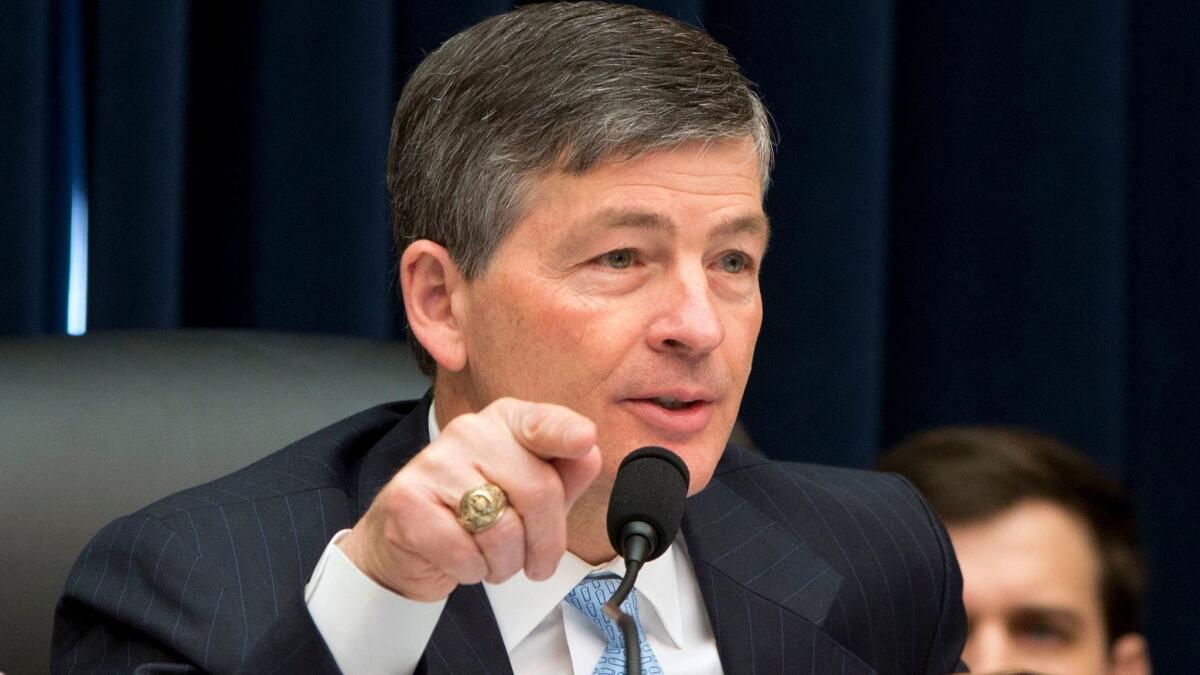Republicans introduce bills to scrap new bank arbitration rule

Republican lawmakers in the House and Senate have introduced bills calling for the repeal of a just-announced regulation that would make it easier for consumers to bring class-action lawsuits against banks.
The rule unveiled last week by the Consumer Financial Protection Bureau would ban banks and other financial institutions from using arbitration clauses to block customers from bringing or joining class-action suits. Republicans had immediately pledged to unwind the rule before it takes effect next year.
On Thursday, GOP members of the House Financial Services Committee and Senate Banking Committee introduced resolutions that would do just that. The resolutions call for using the Congressional Review Act, which allows Congress to scrap new regulations created by federal agencies.
Rep. Jeb Hensarling (R-Texas), chairman of the House committee and a vocal opponent of the CFPB, said the rule is anti-consumer and “should be thoroughly rejected by Congress.”
Sen. Tom Cotton (R-Ark.), one of the sponsors of the Senate bill, called the CFPB a “rogue agency” and said “there’s no need for this anti-arbitration, anti-business rule.”
Banks and other companies often include language in consumer contracts that forces customers to resolve disputes in private arbitration rather than in court. The CFPB rule would allow that practice to continue, but would ban arbitration clauses that also ban consumers from bringing class-action suits.
Such suits, CFPB Director Richard Cordray said last week in introducing the new regulation, allow consumers who have suffered relatively minor harms to join together to hold a big bank accountable and to bring bad practices to light.
Wells Fargo successfully used its arbitration clause to stymie consumer lawsuits over its creation of unauthorized accounts. The bank ultimately agreed to settle nearly a dozen class-action lawsuits for $142 million after its practices created a scandal. But consumer advocates argued that if an arbitration clause had not been in place the bank’s practices might have been uncovered sooner.
Rep. Maxine Waters of Los Angeles, the ranking Democrat on the House committee, called Thursday’s action an “outrageous” move that would harm consumers.
“Republicans should think twice before taking away consumers’ rights to be heard in a court of law,” she said.
Republicans, business groups and attorneys for the finance industry have said that the new CFPB rule would result in a bevy of frivolous class-action litigation. They also argue that, if banks can’t use arbitration to block class-actions, they will likely drop arbitration programs, which would mean that bank customers would have to go to court to settle even minor, individual disputes.
“They’ll say, ‘If a customer has a claim against us and it doesn’t get resolved informally, let them sue us,’” said Alan Kaplinsky, a finance attorney who pioneered the use of arbitration clauses.
The challenge from Republican lawmakers is just one of the ways the arbitration rule could be scrapped or delayed. Keith Noreika, acting head of the Office of the Comptroller of the Currency, a key bank regulator, has said the rule should be put off while his agency studies whether it could harm the banking system.
Follow me: @jrkoren







